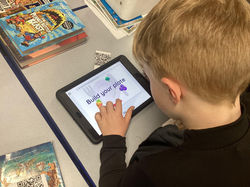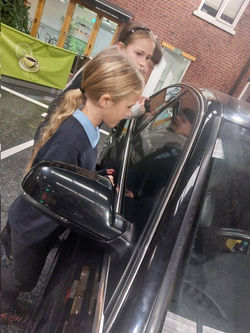Data and Performance
How do we ensure your child is receiving the very best education possible?
As a new academy school, we have not yet been inspected by Ofsted and MANY changes have occurred since the last inspection in January 2017, which can be viewed here.
We have a robust self-evaluation system in place and constantly strive for excellence.
Our staff are highly motivated in making our school a hub for learning where all children are able to achieve.
How do we self evaluate?
-
Child Centred Plans
-
Data Analysis
-
Observation of Teaching & Learning
-
Peer to Peer Coaching
-
Work Scrutiny
-
Pupil Progress Meetings
-
Continuing Professional Development (CPD)
Our School Improvement Goals
-
To develop outstanding behaviour for learning
-
To refine our curriculum design
-
To fully embed English Mastery
-
To fully embed Maths Mastery
What this looks like in the classroom
-
A minimum of "Good" teaching throughout the school
-
Quality resources
-
Consistency in all areas
-
Outward thinking learning themes
-
Good attainment
-
Good progress
-
Parent/Carer and school collaboration
-
Examples of both our learning values and Christian values in action
-
Children being Ready, Respectful, Safe
2018-2019 Data Headlines
End of Key Stage 2
Writing: 90.1% of children reached Age-Related Expectation, 18.2% of whom achieved Greater Depth
Reading: 100% of children reached Age-Related Expectation, 63.6% of whom achieved Greater Depth
Maths: 90.1% of children reached Age-Related Expectation, 18.2% of whom achieved Greater Depth
SPaG: 90.1% of children reached Age-Related Expectation, 45.5% of whom achieved Greater Depth
PSHE and RSE at Kiveton Park Meadows Junior School
At Kiveton Park Meadows, Personal, Social, Health and Economic Education (PSHE) and Relationships and Sex Education (RSE) are key elements of our curriculum. Using the 3D PSHE Programme alongside our PSHE and Relationships & Behaviour Policies, we aim to support children’s holistic development and prepare them for life in modern Britain.
Our Goals
Through PSHE and RSE, pupils develop the skills, knowledge, and attitudes to navigate relationships, make informed decisions, and understand themselves and others. We nurture resilience, well-being, and respect, encouraging children to develop empathy, self-reflection, and a strong sense of responsibility.
Why PSHE and RSE Matters
Learning about physical, emotional, and social well-being equips children with life skills that extend beyond the classroom. Pupils gain confidence, understand healthy relationships, and develop strategies to manage challenges. This foundation promotes positive mental health, encourages responsible citizenship, and supports success in school and later life.
Our PSHE and RSE Curriculum
Our curriculum is delivered through the 3D PSHE Programme, covering social, cultural, spiritual, physical, and moral aspects of life. Together, these programmes teach children to:
-
Respect similarities and differences
-
Build meaningful friendships and relationships
-
Participate fully and positively in modern British society
How PSHE and RSE is Taught
PSHE and RSE is taught daily through a combination of subject knowledge, skill-building, and interactive learning. Children learn both in the classroom and through assemblies, thematic units, and stand-alone lessons. Learning is engaging, reflective, and often hands-on, helping children connect ideas to real-life experiences.
What We Learn
Pupils explore a wide range of topics, including:
-
Physical, emotional, and mental health
-
Healthy lifestyles, hygiene, nutrition, and first aid
-
Aspirations, changing and growing, and emotions
-
Keeping safe and healthy relationships
-
Communication, collaboration, bullying, fairness, and discrimination
-
Family, friends, communities, rules, and responsibilities
-
Money, finance, diversity, and enterprise
Supporting Every Learner
Adaptations ensure all pupils, including those with SEND, can access the curriculum through:
-
Visual prompts and social stories
-
Role-play and hands-on activities (e.g., emotion cards, sensory resources)
-
Clear routines, visual timetables, and group discussions
-
Small group support and recaps on prior learning for reinforcement
-
Bespoke interventions when needed
Pupil Voice
“I enjoyed raising money for Children in Need.”
“I think our school rules and values are really important; we all believe in them.”
“I know what makes a good and loyal friend.”
“I know much more about keeping my mind healthy.”
“In our class we enjoy talking about our feelings and emotions, and that it is okay to feel different ways.”
Showcase
 |  |  |
|---|---|---|
 |  |  |
 |  |  |
 |  |  |
 |  |  |
 |  |  |
 |  |  |
 |  |  |
 |  |  |
 |  |  |
 |  |  |
 |  |  |
 |  |  |
 |  |  |

